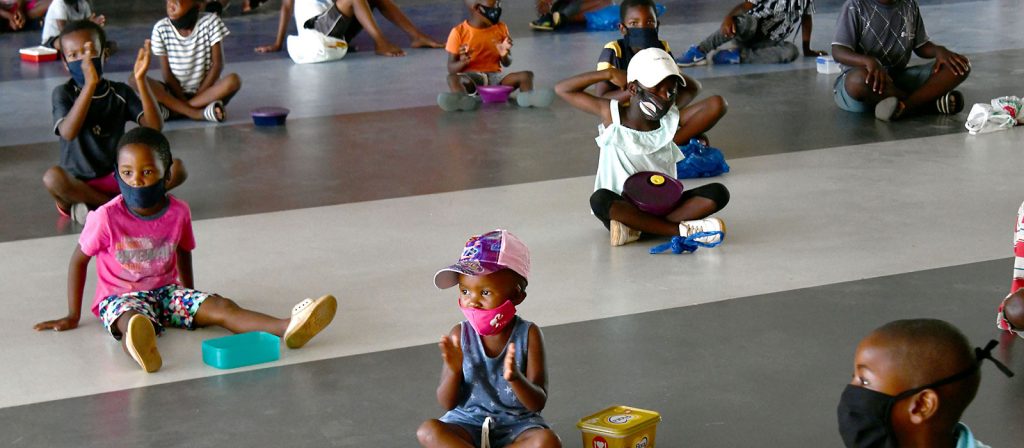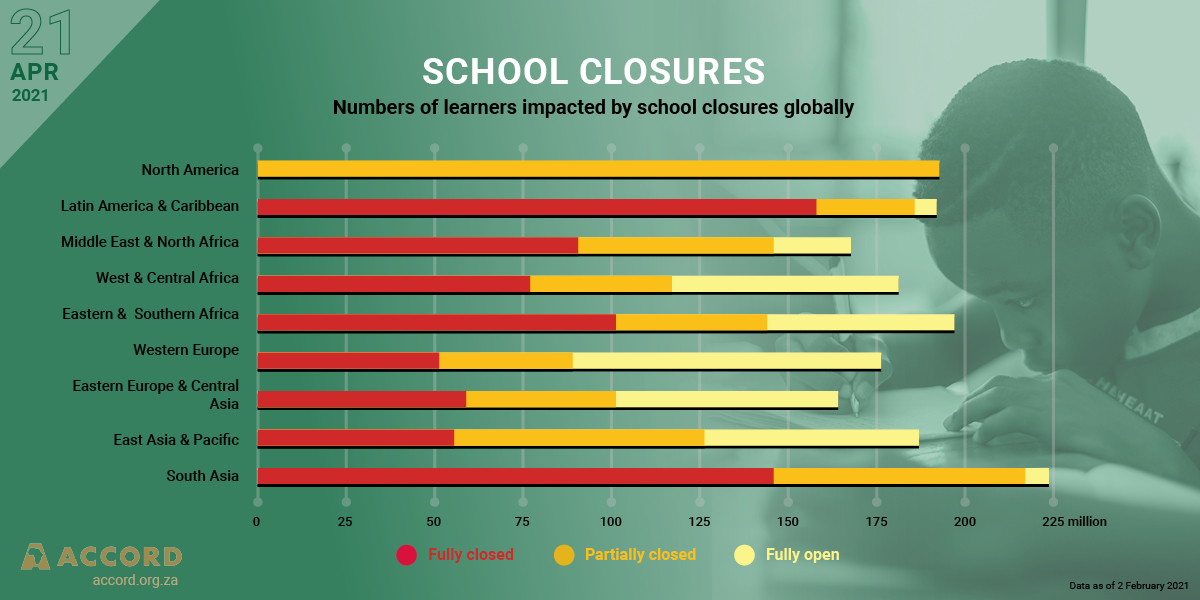Continued shutdowns signal a huge learning regression in Eastern and Southern Africa, a region that was already struggling deeply with educational outcomes, where 87 per cent of children are not meeting basic learning competencies, and where millions of children do not have access to the remote education opportunities available in other parts of the world.
Greater investments in #education are paramount particularly as children return to school in the #COVID-19 era @UNICEFAfrica
Tweet
The educational context of the region is complex and frequently shifting. We see national school closures and reopening due to the epidemiological context, and minimal reopening in some countries for just one to three cohorts of learners, usually those due to take examinations. Eritrea, Lesotho, South Sudan and Uganda fit into this scenario, meaning that the majority of their students have been out of the school system for more than one year. Some countries have also decided not to include pre-primary education in reopening plans fearing that young children will not be able to comply with safety measures, such as mask wearing and social distancing, despite the fact that this age group are the least likely to fall ill.
It is not just children’s learning that is at stake. It has been well documented that when children are out of school for prolonged periods of time, their exposure to physical, emotional and sexual violence increases. During school shutdowns, violence perpetrated against children in the home increased, with a doubling of the reported cases across many child helplines in urban southern Africa. We have also seen that child marriage has increased in some countries since the start of the pandemic, and were taught many hard lessons by Ebola in West Africa, including that after prolonged school closures there were increases in child exploitation, child abuse and adolescent pregnancies, making it even more difficult for the most vulnerable children to return to education. School offers a nutritional lifeline to many too; by April 2020, more than 50 million students had lost access to free, daily meals, with more than 40 million of those impacted for at least six months.
Beyond the removal of school safety structures and profound learning loss being experienced by children, their communities are also being hit by devastating future human capital losses, with the most marginalised at the sharp end.
Declining economic growth due to the pandemic will have significant implications for the financing of the education sector – just when much greater investment is needed. The knock-on impact on tax revenues available for education in the coming years is alarming, particularly when competition for limited resources will heat up amongst other vital sectors such as health. Disadvantaged children, often girls, are likely to suffer the most. Economic decline and loss of livelihoods mean many families will not be able to afford to send their children to secondary school, which does take a significant portion of household resources, and could likely result in children needing to work to contribute to family incomes.
Inequity will not only be felt within countries, but across the continent too. If we look at the share of public spending on education, the poorest countries will lose more. Low-income countries would lose almost twice as much as upper-middle-income countries and more than three times as much as high-income countries.
The pandemic is exacerbating an already precarious education financing situation; only five governments of the 21 countries in the Eastern and Southern Africa region were spending at least 20 per cent of their budgets on education as per the pre-crisis Education for All target. Given many governments have borrowed funds to offset shortfalls in their public spending pots, rising debt burdens will further threaten investment in education across the region. Without increased support, especially from international financial institutions, the region’s pre-pandemic learning crisis could transform into a learning catastrophe, with severe long-term economic and development consequences.

Greater investments in education are paramount particularly as children return to school in the COVID-19 era. As Governments open schools they must increasingly invest in water and hygiene facilities to ensure the safety of students and teachers, as well as in resources to support catch-up on learning losses.
There are solutions though, to not only plug the widening gap in funds needed for education across a region in the midst of a pandemic, but to also build back better and more efficient learning infrastructure in Eastern and Southern Africa, as well as give countries the chance of successfully achieving Sustainable Development Goal 4 covering inclusive and equitable quality education for all.
For example, education should be positioned at the centre of fiscal stimuli packages and annual budget processes. Among other short-term priorities, Eastern and Southern African governments and their development partners should finance preparedness plans to improve water and sanitation services, procure additional desks and chairs and support remedial learning. The prioritization and efficiency of budgets can also be improved. For example, in the short term, big infrastructure projects alongside training activities should be de-prioritized to allow for greater spending on keeping students safe and efforts to recover lost learning.
The scale of the looming debt crisis puts education financing at great risk too unless debt relief and restructuring strategies are negotiated. For many poorer countries, there is no question that at least partial debt forgiveness will be required. Measures such as debt swaps – where a portion of upcoming debt payments can be redeployed to support education budgets – should also be strongly considered.
As the #pandemic continues to evolve, impacting #education and economic recovery across #Africa, schools must be the last to close down, and first to open up @UNICEFAfrica
Tweet
Most pressing though are decisions on schools reopening and closing, which must be taken based on evidence, such as level of transmission in the local community, with nationwide school closures avoided wherever possible. When back-to-normal reopening is not possible, governments can consider various learning strategies, such as part-time, in shift, or outdoor options. They can also fully open sub-regions, particularly in rural areas with no or very few cases.
Learning has completely stopped for millions of children in the region. Access to online learning is simply not a reality for many in Eastern and Southern Africa, where 84 per cent of the population reside in rural Africa, and where there are limited alternatives to going into a classroom. Given the pandemic will continue well into 2021, and most likely into the coming years somewhat, we need to make school a safe place for children to return to and resume their daily lives – particularly when they have a limited role in spreading the virus.
For their immediate well-being and safety, and for the success of their future selves and communities, decisions to close and open schools must be taken with much care and analysis. As the pandemic continues to evolve, impacting education and economic recovery across Africa, schools must be the last to close down, and first to open up.
Abhiyan Jung Rana is the UNICEF Regional Education Advisor for Eastern and Southern Africa.


